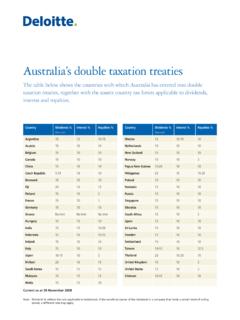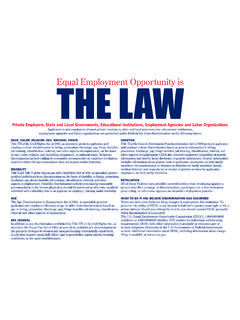Transcription of Deloitte Touche Tohmatsu ABN 74 490 121 060 …
1 Liability limited by a scheme approved under Professional Standards Legislation. Circular to Investors Deloitte Touche Tohmatsu ABN 74 490 121 060 Woodside Plaza Level 14 240 St Georges Terrace Perth WA 6000 GPO Box A46 Perth WA 6837 Australia DX: 206 Tel: +61 (0) 8 9365 7000 Fax: 08 9365 7001 CIRCULAR TO MEMBERS 4 December 2008 Dear Sir/Madam PWL ACN 084 252 488 Ltd (formerly Palandri Wines Ltd) (PWL) (in Liquidation) The Margaret River Wine Business ARSN 086 241 198 The Palandri America Wine Business ARSN 098 544 908 Palandri Winegrape Project 2005/2006 ARSN 114 193 234 Palandri Global Supply Challenge 2007-2008 ARSN 124 150 616 As you may be aware, John Greig, Neil Cussen and I were appointed Liquidators of PWL on 7 October 2008 following our earlier appointment as Administrators on 26 February 2008. PWL is the responsible entity of, among others, the following managed investment schemes: The Margaret River Wine Business ARSN 086 241 198; The Palandri America Wine Business ARSN 098 544 908; Palandri Winegrape Project 2005/2006 ARSN 114 193 234; and Palandri Global Supply Challenge 2007 - 2008 ARSN 124 150 616; (collectively referred to as the Grower Schemes).
2 We are writing to you because you are recorded in the books and records of PWL as having had or continuing to have an interest in one or more of the Grower Schemes. As you may be aware, on 24 September 2008 the Supreme Court of Western Australia ordered, among other things, that the Grower Schemes be wound up. It was also ordered that registered liquidators, Mark Anthony Conlan and Neil Raymond Cribb (Scheme Liquidators) be appointed on a joint and several basis as the persons responsible for winding up, among others, the Grower Schemes in accordance with the constitutions of those schemes and any orders of the Court made under sub section 601NF(2) of the Corporations Act 2001 (Cth) (Act). In accordance with those orders, the Grower Schemes are now being wound up. 1 Sale of Vineyards The Grower Schemes operated on a number of vineyards which, with one exception, are either owned by companies related to PWL or by PWL in trust for investors of another managed investment scheme, namely the Palandri Agricultural Property Trust ARSN 114 192 933 (PAPT Scheme).
3 The companies related to PWL and the PAPT Scheme are also in the Circular to Investors Page 2 4 December 2008 process of being wound up. The exception relates to a vineyard known as Frankland River No 1, which was leased by PWPL ACN 085 042 879 Ltd (formerly Palandri Wine Production Ltd) (In Liquidation) (PWPL) from an unrelated company. These leases have now been transferred by PWPL. Some of the vineyards are currently the subject of contracts of sale and in respect of others, it is intended that contracts of sale will be entered into shortly. The sale of those properties is a necessary part of the windings up of the companies that own those vineyards and the winding up of the PAPT Scheme. However, in order to settle on the sales of those vineyards, it is important for the sellers of the property to be able to convey clear title to the land free of any restrictions imposed by the lease and management agreements, the Schemes and things affixed to the land such as vines and any grapes.
4 2 Lease and Management Agreements When you subscribed for interests in one of more of the Grower Schemes, PWL as your attorney entered into a lease and management agreement pursuant to which one or more vineyard lots were leased to you by PWL or in some cases PWPL, and PWL agreed to manage those vineyard lots on your behalf. We consider that once the Schemes are fully wound up, the lease and management agreements will come to an end. However, due to the complexity of the Schemes, it will take some time for the windings up of the Schemes to complete. In the interim, it is important for the lease and management agreements to be terminated prior to the completion of the windings up to assist in the expeditious sale of the vineyards prior to the next harvest. Pursuant to the constitutions of each of the Grower Schemes, PWL is entitled to terminate the lease and management agreements during the course (rather than having to wait until the end) of the windings up of the Schemes.
5 However, in Schemes where PWPL or another entity is the lessor, it is unclear as to whether the exercise of that power by PWL will permit the termination of a lease from PWPL or another entity prior to the conclusion of the windings up. We do not consider that the rights of members of the Grower Schemes will be adversely affected by the termination of any lease and management agreement to which growers may be a party during the windings up of the Schemes as compared to termination at the end of the windings up. Accordingly, the liquidators intend to take steps to rectify the discrepancy between Schemes and cause all lease and management agreements to be terminated as soon as possible rather than at the end of the windings up as set out further below. 3 Grapes and Vines The lease and management agreements and the constitutions of the Grower Schemes do not expressly state what is to happen to the vines and the grapes after termination of the lease and management agreements.
6 There are provisions in the constitutions or the lease and management agreements of the Grower Schemes to the effect that the grapes and in some cases the vines are vested in (or owned by) the members. We have taken legal advice as to the effect of these provisions. We consider that there is some doubt about whether those provisions are legally effective in Circular to Investors Page 3 4 December 2008 accordance with their terms, particularly in respect of vines. Vines are generally regarded as fixtures and form part of the land. As members do not own the land, we consider it is unlikely that they have any right of ownership or otherwise over the vines, particularly once the lease and management agreements have come to an end. In some constitutions, there is express provision to permit the members to remove certain types of property (but not expressly vines) within 30 days of the lease and management agreements coming to an end.
7 Even if growers were permitted legally to remove vines within 30 days of the lease and management agreements coming to an end (which we doubt), there are a number of reasons why that practically could not be achieved or would be of no benefit or value to members. The reasons include the following: (a) Potentially, there could be competing claims to the vines between members of the various Grower Schemes. This means that more than one particular member could potentially have a claim over the same vine. (b) The vine, once uprooted, must be carefully cared for and is unlikely to be suitable for any commercial viticultural activity. (c) At the time the vines would need to be removed, it is possible that any grapes growing on the vines would not be ripe and accordingly would be wasted. (d) Members would incur a labour cost to remove the vines. (e) If the vines are removed, it is likely that members would be obliged to take remedial action to ensure that the vineyards are left in good condition.
8 Unlike the situation with the 2008 vintage, we consider it is not viable to harvest the grapes for the 2009 vintage and as a consequence, we are unable to raise funds to carry out that harvest. Accordingly, it is not open to us to simply wait until the next harvest is ready before terminating the lease and management agreements. Even if the lease and management agreements were not terminated until after the harvest of the 2009 vintage, the same difficulty would arise in relation to the 2010 vintage. Finally, even if some other party was willing to carry out the harvest of the 2009 vintage, it is likely that growers would be required to pay the shortfall which would exist between the value of the grapes on the one hand and the harvesting and maintenance costs on the other. Details of the costs incurred by us in performing the harvest for the 2008 vintage have been sent to you previously. Those costs do not take into account the cost of maintaining the vines for the period prior to harvest.
9 Excluding those costs, we consider it is unlikely that members will receive any proceeds from that harvest due to the insolvency of the Schemes. Taking into account the additional costs of maintenance for the current year and the anticipated reduction in the price of wine grapes for the 2009 vintage, we consider the possibility of members deriving any benefit from the 2009 vintage to be remote. It follows that whichever course is followed, members are unlikely to derive any benefit at all from the grapes for the 2009 vintage and may incur further liabilities to PWL. For this reason, we consider that if members have rights to the grapes and vines after termination of the lease and management agreements, those rights are of no economic value. There is also a very real prospect that the grapes for the 2009 vintage will simply rot on the vine if steps are not taken to resolve the uncertainty and we are unable to settle the sale of the Circular to Investors Page 4 4 December 2008 vineyards prior to the next harvest.
10 If this occurs, it is likely that the vines and the value of the vineyards will be adversely affected. 4 Amendment of Constitutions Given the difficulties referred to above, we are giving notice of the liquidators intention to cause PWL to modify the constitutions of all of the Grower Schemes pursuant to section 601GC of the Corporations Act 2001 (Cth). PWL may unilaterally modify the constitution if it reasonably considers the change will not adversely affect members rights. The modifications that will be made will include the following: (a) The addition of a clause which provides that upon exercise of the power of termination of the lease and management agreement by PWL, both the lease and the management aspects of the agreement come to an end, regardless of who the lessor is. (b) The addition of a clause which provides that upon termination of the lease and management agreements, members have no right or entitlement to either the vines or the grapes growing on the vineyards.


